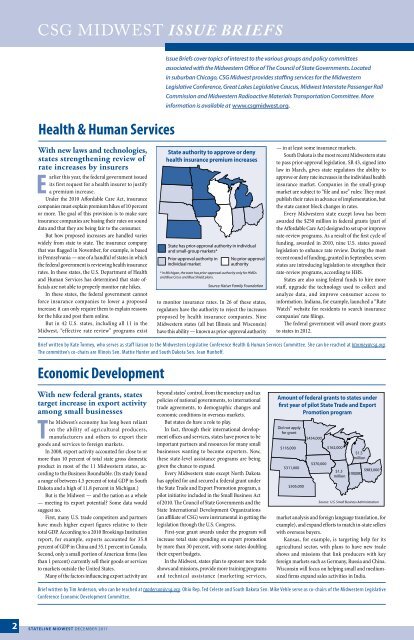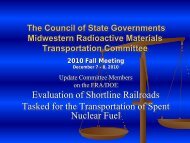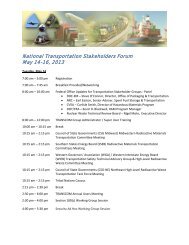Stateline Midwest - CSG Midwest
Stateline Midwest - CSG Midwest
Stateline Midwest - CSG Midwest
You also want an ePaper? Increase the reach of your titles
YUMPU automatically turns print PDFs into web optimized ePapers that Google loves.
<strong>CSG</strong> <strong>Midwest</strong> Issue Briefs<br />
Health & Human Services<br />
Issue Briefs cover topics of interest to the various groups and policy committees<br />
associated with the <strong>Midwest</strong>ern Office of The Council of State Governments. Located<br />
in suburban Chicago, <strong>CSG</strong> <strong>Midwest</strong> provides staffing services for the <strong>Midwest</strong>ern<br />
Legislative Conference, Great Lakes Legislative Caucus, <strong>Midwest</strong> Interstate Passenger Rail<br />
Commission and <strong>Midwest</strong>ern Radioactive Materials Transportation Committee. More<br />
information is available at www.csgmidwest.org.<br />
With new laws and technologies,<br />
states strengthening review of<br />
rate increases by insurers<br />
E<br />
arlier this year, the federal government issued<br />
its first request for a health insurer to justify<br />
a premium increase.<br />
Under the 2010 Affordable Care Act, insurance<br />
companies must explain premium hikes of 10 percent<br />
or more. The goal of this provision is to make sure<br />
insurance companies are basing their rates on sound<br />
data and that they are being fair to the consumer.<br />
But how proposed increases are handled varies<br />
widely from state to state. The insurance company<br />
that was flagged in November, for example, is based<br />
in Pennsylvania — one of a handful of states in which<br />
the federal government is reviewing health insurance<br />
rates. In these states, the U.S. Department of Health<br />
and Human Services has determined that state officials<br />
are not able to properly monitor rate hikes.<br />
In these states, the federal government cannot<br />
force insurance companies to lower a proposed<br />
increase; it can only require them to explain reasons<br />
for the hike and post them online.<br />
But in 42 U.S. states, including all 11 in the<br />
<strong>Midwest</strong>, “effective rate review” programs exist<br />
State authority to approve or deny<br />
health insurance premium increases<br />
State has prior-approval authority in individual<br />
and small-group markets*<br />
Prior-approval authority in<br />
individual market<br />
No prior-approval<br />
authority<br />
* In Michigan, the state has prior-approval authority only for HMOs<br />
and Blue Cross and Blue Shield plans.<br />
Source: Kaiser Family Foundation<br />
to monitor insurance rates. In 26 of these states,<br />
regulators have the authority to reject the increases<br />
proposed by health insurance companies. Nine<br />
<strong>Midwest</strong>ern states (all but Illinois and Wisconsin)<br />
have this ability — known as prior-approval authority<br />
— in at least some insurance markets.<br />
South Dakota is the most recent <strong>Midwest</strong>ern state<br />
to pass prior-approval legislation. SB 43, signed into<br />
law in March, gives state regulators the ability to<br />
approve or deny rate increases in the individual health<br />
insurance market. Companies in the small-group<br />
market are subject to “file and use” rules: They must<br />
publish their rates in advance of implementation, but<br />
the state cannot block changes in rates.<br />
Every <strong>Midwest</strong>ern state except Iowa has been<br />
awarded the $250 million in federal grants (part of<br />
the Affordable Care Act) designed to set up or improve<br />
rate-review programs. As a result of the first cycle of<br />
funding, awarded in 2010, nine U.S. states passed<br />
legislation to enhance rate review. During the most<br />
recent round of funding, granted in September, seven<br />
states are introducing legislation to strengthen their<br />
rate-review programs, according to HHS.<br />
States are also using federal funds to hire more<br />
staff, upgrade the technology used to collect and<br />
analyze data, and improve consumer access to<br />
information. Indiana, for example, launched a “Rate<br />
Watch” website for residents to search insurance<br />
companies’ rate filings.<br />
The federal government will award more grants<br />
to states in 2012.<br />
Brief written by Kate Tormey, who serves as staff liaison to the <strong>Midwest</strong>ern Legislative Conference Health & Human Services Committee. She can be reached at ktormey@csg.org.<br />
The committee’s co-chairs are Illinois Sen. Mattie Hunter and South Dakota Sen. Jean Hunhoff.<br />
Economic Development<br />
With new federal grants, states<br />
target increase in export activity<br />
among small businesses<br />
The <strong>Midwest</strong>’s economy has long been reliant<br />
on the ability of agricultural producers,<br />
manufacturers and others to export their<br />
goods and services to foreign markets.<br />
In 2008, export activity accounted for close to or<br />
more than 10 percent of total state gross domestic<br />
product in most of the 11 <strong>Midwest</strong>ern states, according<br />
to the Business Roundtable. (Its study found<br />
a range of between 4.5 percent of total GDP in South<br />
Dakota and a high of 11.8 percent in Michigan.)<br />
But is the <strong>Midwest</strong> — and the nation as a whole<br />
— meeting its export potential? Some data would<br />
suggest no.<br />
First, many U.S. trade competitors and partners<br />
have much higher export figures relative to their<br />
total GDP. According to a 2010 Brookings Institution<br />
report, for example, exports accounted for 35.8<br />
percent of GDP in China and 35.1 percent in Canada.<br />
Second, only a small portion of American firms (less<br />
than 1 percent) currently sell their goods or services<br />
to markets outside the United States.<br />
Many of the factors influencing export activity are<br />
beyond states’ control, from the monetary and tax<br />
policies of national governments, to international<br />
trade agreements, to demographic changes and<br />
economic conditions in overseas markets.<br />
But states do have a role to play.<br />
In fact, through their international development<br />
offices and services, states have proven to be<br />
important partners and resources for many small<br />
businesses wanting to become exporters. Now,<br />
these state-level assistance programs are being<br />
given the chance to expand.<br />
Every <strong>Midwest</strong>ern state except North Dakota<br />
has applied for and secured a federal grant under<br />
the State Trade and Export Promotion program, a<br />
pilot initiative included in the Small Business Act<br />
of 2010. The Council of State Governments and the<br />
State International Development Organizations<br />
(an affiliate of <strong>CSG</strong>) were instrumental in getting the<br />
legislation through the U.S. Congress.<br />
First-year grant awards under the program will<br />
increase total state spending on export promotion<br />
by more than 30 percent, with some states doubling<br />
their export budgets.<br />
In the <strong>Midwest</strong>, states plan to sponsor new trade<br />
shows and missions, provide more training programs<br />
and technical assistance (marketing services,<br />
Amount of federal grants to states under<br />
first year of pilot State Trade and Export<br />
Promotion program<br />
Did not apply<br />
for grant<br />
$116,000<br />
$311,000<br />
$505,000<br />
$454,000<br />
$370,000<br />
$162,000<br />
$1.5<br />
million<br />
$1.3<br />
million $100,000<br />
$983,000<br />
Source: U.S. Small Business Administration<br />
market analysis and foreign language translation, for<br />
example), and expand efforts to match in-state sellers<br />
with overseas buyers.<br />
Kansas, for example, is targeting help for its<br />
agricultural sector, with plans to have new trade<br />
shows and missions that link producers with key<br />
foreign markets such as Germany, Russia and China.<br />
Wisconsin will focus on helping small and mediumsized<br />
firms expand sales activities in India.<br />
Brief written by Tim Anderson, who can be reached at tanderson@csg.org. Ohio Rep. Ted Celeste and South Dakota Sen. Mike Vehle serve as co-chairs of the <strong>Midwest</strong>ern Legislative<br />
Conference Economic Development Committee.<br />
2 STATELINE MIDWEST December 2011








